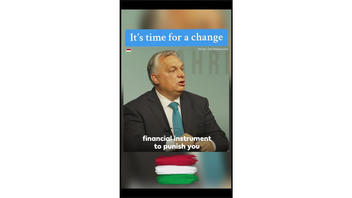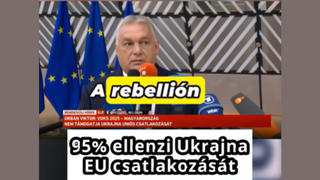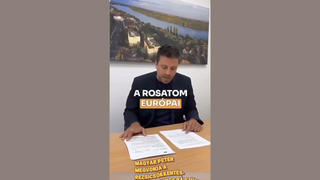
Is Hungary a net contributor to the European Union budget, paying more than it receives in funding? No, that's not true: European Commission data shows that Hungary has been a net beneficiary of the EU budget every year since it joined the bloc in 2004. In December 2022, the European Commission postponed the transfer of cohesion funds to Hungary due to its perceived shortcomings in the rule of law and other policy areas; however, the Commission intends to remit this money once Hungary addresses its concerns.
The claim appeared in a video (archived here) on TikTok on November 24, 2023, under the English-language caption "It's time for a change." It shows Hungarian Prime Minister Viktor Orbán at a forum in Zurich, Switzerland, on November 22, 2023, saying in English:
Because of the sanctions, we don't get the money from the European Union which we should get, what we have to pay in. We are net contributors! So the country at the level of development [of] 76 percent [of the EU average] is a net contributor! How is it possible?
This is what the post looked like on TikTok at the time of writing:

(Source: TikTok screenshot taken on Sun Nov 26 19:23:15 2023 UTC)
The video on TikTok lacks context for Orbán's comments. He mentions "sanctions," referring to the European Commission's decision on December 22, 2022, to withhold around €22 billion (close to $24 billion) in cohesion funds for the 2021-27 budget period. This decision was made due to concerns about Hungary's performance in areas such as public procurement, judiciary independence, academic freedom and other issues. Orbán had discussed these "sanctions" earlier in his presentation.
The Commission made it clear that the EU's "conditionality regulation" authorized it to suspend the funds in order to "protect the Union budget against breaches of the rule of law." It also said the funds would be released once Hungary addresses its concerns:
The measures adopted in the implementing decision are temporary and can be lifted by the [European] Council, acting on a proposal from the Commission, without loss of Union funding, if the situation is fully remedied within two years.
In other words, Hungary's €1.8 billion ($2 billion) contribution to the EU's 2023 budget from its own resources will be balanced out by the funds the EU intends to release. Orbán mentioned in his speech in Zurich that he estimates this released amount to be around €3 billion ($3.2 billion) to €4 billion ($4.3 billion) annually.
Data on the European Commission's website shows that Hungary has been a net recipient of EU funds every year since it joined in 2004 -- a fact Orbán himself acknowledged as recently as July 2022.
A poll published by Hungarian think tank Policy Solutions on September 21, 2023, found that 36 percent of respondents believed Hungary was a net contributor to the EU budget. This number rose to about 50 percent among supporters of Orbán's Fidesz party, the survey said.
The EU budget channels "cohesion funds" from richer member states such as Germany to poorer countries to help ensure "peace and stability both within and around the EU, security, better infrastructure and the freedom to live, work, study and travel anywhere in the bloc," according to the Commission's website.















